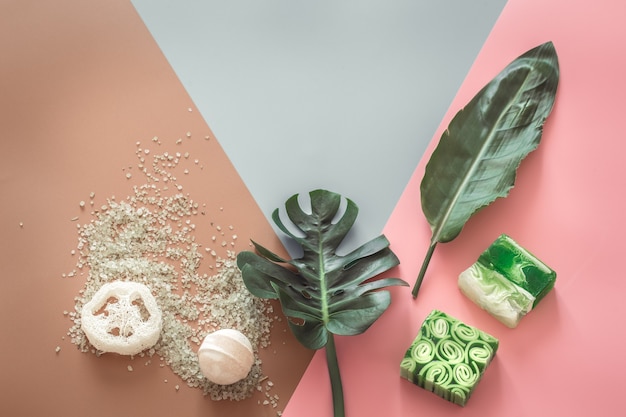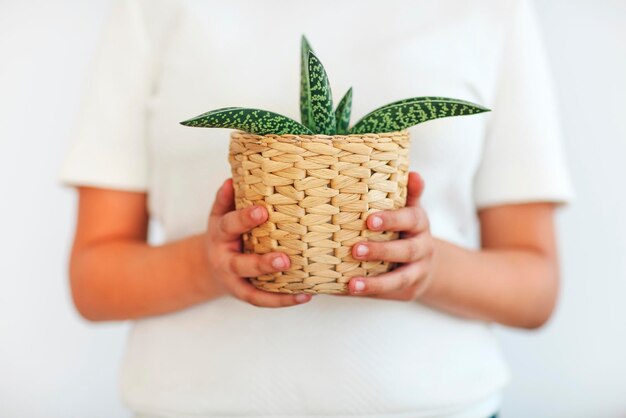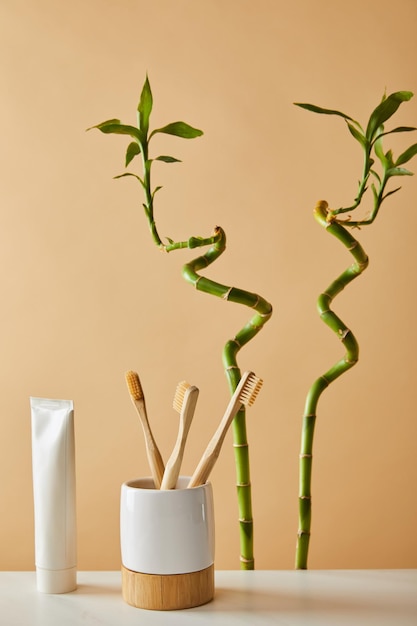Sustainable Swaps: 5 Viral Ways to Reduce Your Carbon Footprint

Sustainable swaps are gaining traction, offering simple changes in daily habits to significantly reduce your carbon footprint, promoting eco-friendly living and combating climate change.
Are you looking to live a more eco-friendly life? With environmental awareness on the rise, sustainable swaps are going viral, presenting achievable steps to minimize your carbon footprint and embrace a greener lifestyle. Let’s dive into some easy and effective ways to make a difference.
Understanding the Viral Trend of Sustainable Swaps
The internet is buzzing with discussions about sustainable swaps. But what exactly are they, and why are they capturing so much attention? Let’s break down the essentials of this growing trend.
Sustainable swaps involve replacing conventional, often environmentally harmful products and practices with eco-friendly alternatives. These swaps aim to reduce waste, conserve resources, and minimize your environmental impact.
Why Are Sustainable Swaps Becoming So Popular?
The virality of sustainable swaps is fueled by a growing global awareness of environmental issues like climate change, pollution, and resource depletion. People are actively seeking ways to contribute to a healthier planet.
- Accessibility: Sustainable swaps are easy to understand and implement. They don’t require drastic lifestyle changes.
- Cost-Effectiveness: Many swaps can save money in the long run. For example, reusable water bottles and coffee cups reduce the need for disposable purchases.
- Community Engagement: Social media platforms amplify the visibility of sustainable swaps, encouraging individuals to share their experiences and inspire others.

Sustainable swaps are more than just a trend; they represent a shift towards mindful consumption and conscious living. They empower individuals to take actionable steps toward a greener future.
Swap 1: Ditch Plastic Wrap for Beeswax Wraps
One of the most popular sustainable swaps involves replacing single-use plastic wrap with beeswax wraps. This simple change can significantly reduce plastic waste in your kitchen.
Plastic wrap is a staple in many households, but it’s also a major source of pollution due to its non-biodegradable nature. Beeswax wraps offer a natural and reusable alternative.
What Are Beeswax Wraps?
Beeswax wraps are made from cotton fabric coated with beeswax, tree resin, and jojoba oil. This combination creates a pliable and slightly sticky material that can be used to cover bowls, wrap sandwiches, and preserve food.
- Reusable: Beeswax wraps can be used repeatedly for up to a year with proper care.
- Biodegradable: Made from natural materials, beeswax wraps are compostable, reducing landfill waste.
- Non-Toxic: They are free from harmful chemicals like BPA and phthalates, ensuring food safety.
Switching to beeswax wraps is not only eco-friendly but also adds a touch of rustic charm to your kitchen. They are easy to clean with cool water and gentle soap, making them a practical and sustainable choice.
Swap 2: Say Goodbye to Plastic Bottles with Reusable Water Bottles
Another impactful sustainable swap is replacing disposable plastic water bottles with reusable ones. Staying hydrated doesn’t have to contribute to plastic pollution.
Plastic water bottles are a significant environmental problem, with billions ending up in landfills and oceans each year. Reusable water bottles offer a durable and eco-friendly solution.
The Benefits of Reusable Water Bottles
Reusable water bottles come in various materials, including stainless steel, glass, and BPA-free plastic. They are designed to be used repeatedly, reducing the need for disposable bottles.
Choosing a reusable water bottle has several advantages:
- Reduces Plastic Waste: By eliminating the need for single-use bottles, you directly decrease plastic waste.
- Cost Savings: Over time, using a reusable bottle saves money compared to buying bottled water regularly.
- Healthier Option: Reusable bottles are often made from materials that don’t leach harmful chemicals into your water.
Carrying a reusable water bottle is a simple yet powerful way to reduce your environmental impact and stay hydrated sustainably.
Swap 3: Trade Paper Towels for Reusable Cloths
Moving away from disposable paper towels to reusable cloths is a practical sustainable swap that reduces waste and saves money. It’s a small change with significant environmental benefits.
Paper towels are convenient, but their constant use contributes to deforestation and landfill waste. Reusable cloths provide an eco-friendly alternative for cleaning and wiping.

Why Choose Reusable Cloths?
Reusable cloths can be made from various materials, including cotton, microfiber, and bamboo. They are washable and can be used for multiple cleaning tasks.
- Waste Reduction: Reusable cloths eliminate the need for paper towels, reducing paper waste.
- Cost-Effective: Investing in a set of reusable cloths can save money compared to constantly buying paper towels.
- Versatile: They can be used for cleaning, wiping spills, and drying hands.
Switching to reusable cloths is an easy and effective way to reduce your environmental footprint while maintaining a clean home. Simply wash and reuse them, making them a sustainable choice for your daily cleaning routine.
Swap 4: Switch to Bamboo Toothbrushes
Opting for bamboo toothbrushes is a sustainable swap that addresses plastic waste in your oral hygiene routine. This simple change can make a big difference over time.
Plastic toothbrushes are a common source of plastic pollution, as they take hundreds of years to decompose. Bamboo toothbrushes offer a biodegradable alternative.
The Advantages of Bamboo Toothbrushes
Bamboo toothbrushes feature a handle made from bamboo, a fast-growing and sustainable resource. The bristles are often made from nylon, but some brands offer biodegradable options.
Using a bamboo toothbrush provides several benefits:
- Biodegradable: Bamboo handles decompose naturally, reducing landfill waste.
- Sustainable Material: Bamboo is a renewable resource that grows quickly without the need for pesticides.
- Effective Cleaning: Bamboo toothbrushes clean teeth just as effectively as plastic ones.
Making the switch to bamboo toothbrushes is a simple yet impactful way to reduce plastic waste in your bathroom and promote a more sustainable lifestyle.
Swap 5: Embrace Reusable Shopping Bags
Using reusable shopping bags is a classic sustainable swap that remains highly effective in reducing plastic bag waste. Always remember to bring your own bags when you go shopping.
Plastic shopping bags are a major source of pollution, often ending up in landfills and oceans. Reusable shopping bags offer a durable and eco-friendly alternative.
Why Reusable Shopping Bags Are Essential
Reusable shopping bags come in various materials, including cotton, canvas, and recycled plastic. They are designed to be used repeatedly, reducing the need for single-use bags.
- Reduces Plastic Waste: By using reusable bags, you help reduce the number of plastic bags that end up in the environment.
- Durable and Strong: Reusable bags are often more durable than plastic bags, allowing you to carry heavier loads.
- Stylish and Convenient: They come in various designs and can be easily stored in your car or home.
Adopting reusable shopping bags is a straightforward and effective way to minimize your environmental impact and promote sustainable shopping habits.
| Key Swap | Brief Description |
|---|---|
| ♻️ Beeswax Wraps | Replace plastic wrap with reusable beeswax wraps. |
| 💧 Reusable Bottles | Use reusable water bottles instead of disposable plastic ones. |
| 🌿 Reusable Cloths | Switch from paper towels to reusable cloths for cleaning. |
| 🪥 Bamboo Toothbrushes | Opt for bamboo toothbrushes to reduce plastic waste in oral care. |
FAQ: Sustainable Swaps
▼
Sustainable swaps are simple replacements of everyday items with eco-friendly alternatives. These swaps reduce waste and minimize environmental impact, promoting a greener lifestyle.
▼
They help reduce pollution, conserve resources, and combat climate change. By making conscious choices, individuals contribute to a healthier and more sustainable planet for future generations.
▼
Start small by identifying single-use items in your daily routine and finding sustainable alternatives. Focus on areas like kitchen, bathroom, and shopping habits to make easy changes.
▼
Some sustainable products may have a higher upfront cost, but many save money in the long run by reducing the need for frequent replacements. Consider the long-term benefits.
▼
Sustainable products are available at many grocery stores, online retailers, and specialty eco-friendly shops. Look for certifications and eco-labels to ensure product authenticity.
Conclusion
Embracing sustainable swaps is a practical and impactful way to reduce your carbon footprint and contribute to a healthier planet. By making small changes in your daily habits, you can join the viral movement towards a more sustainable future.
